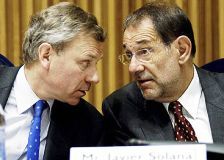Nato, EU have difficulties to coordinate action to Darfur
BRUSSELS, June 8 (AFP) — NATO defence ministers meet in Brussels Thursday to finalize support for African peacekeepers in Sudan’s battle-scarred Darfur region, but are struggling to coordinate their action with the EU.

|
|
NATO Secretary Gneral Jaap de Hoop Scheffer (L) speaks to European Union foreign policy chief Javier Solana at the donors’ conference aimed at boosting aid for the African Union’s peace mission in Sudan’s troubled western region of Darfur.(AFP). |
NATO and the European Union have both pledged to help the African Union, which is preparing to double its forces next month in Darfur, ravaged by civil war which is exacerbating a humanitarian crisis.
Officially, both NATO and the 25-member EU insist there is no rivalry between the two organizations over Darfur, with both agreeing the priority must be to bring urgently-needed help to Sudan.
But despite a string of meetings there has been no concrete decision on coordinating their support, which Washington wants provided by NATO while France has insisted on providing its resources solely through the EU.
“We hope by Thursday to have a package of NATO proposals to offer,” said a senior NATO diplomat ahead of the two-day Brussels talks gathering US Defense Secretary Donald Rumsfeld with his NATO counterparts.
WHICH ONE WILL COORDINATE ACTION
At the heart of the tension between the two organizations is the issue which should coordinate support, notably to provide troop transport.
The EU stresses that it is already on the ground, and is supporting the African Union both economically and with manpower.
“We believe NATO should have the lead in coordinating airlift,” said another senior NATO diplomat. “We think this issue can be resolved before we start operations,” he added, saying that “it would be a major setback if we can’t sort it out.”
The two-year-old conflict in Darfur has killed between 180,000 and 300,000 people and displaced more than two million and is considered to be one of the world’s worst humanitarian crises.
As well as Darfur, Rumsfeld — arriving from Norway, on the latest stop of a trip which has also taken him to Asia — will discuss plans to boost NATO support for Afghan parliamentary elections in September.
NATO has led the 8,300-strong International Security Assistance Force (ISAF) in Afghanistan since 2003, and is in the process of expanding the operation into the west of the country.
The military alliance will provide temporary reinforcements for the September 18 polls. Currently Spain, Romania and the Netherlands are expected to provide the bulk of the extra troops, NATO diplomats say.
An additional 3,000 troops are expected to be deployed, mainly in the north and the west of the country, as well as the capital Kabul.
In addition, the NATO ministers will meet with their Russian counterpart, Sergei Ivanov, as well as Ukrainian Defence Minister Anatoly Grytsenko, whose country is keen to boost ties with NATO after last year’s Orange Revolution.
During the Brussels talks Rumsfeld is also likely to update his European counterparts on the latest US plans to redeploy its forces stationed in Europe since the Cold War, according to diplomats.
His German counterpart Peter Struck could meanwhile raise the issue of the presence of nuclear arms on his country’s territory, officials said without elaborating.
